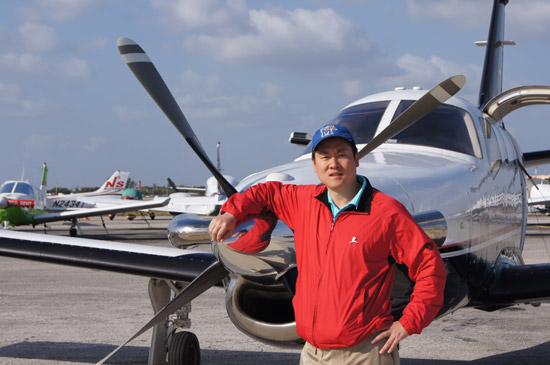Fly the world in 70 days
Updated: 2011-06-08 07:52
By Cheng Yingqi (China Daily)
|
|||||||||||
BEIJING - Chen Wei doesn't just want to fly high, he wants to fly around the world.
Alone.
In a small plane.
And be the first Chinese to do so.
 |
|
Chen Wei, a 40-year-old Changsha native, poses in front of the single-engine plane which he is using to become the first Chinese to fly solo around the world. Provided to China Daily |
Since taking off on May 22 from his home in Memphis in the United States, Chen has been to 11 cities in seven countries.
He plans to finish the trip in the coming 53 days to accomplish his goal of stopping off in 40 cities in 21 nations across the world within 70 days.
According to Chen, 167 people have completed such a trip in a single-engine plane, but no Chinese.
"I want to be the first Chinese person to finish a circumnavigation," Chen said.
Born into a well-off family in 1971 in Changsha, Hunan province, Chen has yearned for the skies since he was a child.
When he failed the test to become a military pilot, he entered a college in China and then went to the United States for postgraduate education in business in 1995. Since then, Chen has lived in the US and become a successful businessman.
However, Chen never forgot his dream of flying.
In 2006, he joined private flying clubs and received a pilot's license in 2007.
Before starting out to circumnavigate the globe, Chen had spent more than 450 hours in the sky and bought himself several aircraft.
"Circumnavigation is a systematic project, you have to calculate your schedule, take the expiration of your visas into consideration, and take care of all the emergency situations," Chen said.
Luckily Chen was not alone - he received help from more than 100 friends and aviation fans across the world. Some gave him precautions, some helped draw up flight plans, others assisted with visa applications and flight permissions in different countries.
"I wouldn't even be able to start the trip without the help of my friends, especially overseas Chinese. Though I might be the one who made the final decision, the whole plan is actually based on their work," Chen said.
Since visas are valid for 90 days in most countries, and Chen's trip lasts for 70 days, friends and aviation fans across the world helped arrange a detailed schedule so he could get visas for all 21 countries within 60 days before taking off.
They also helped study aircraft requirements in various nations, and helped Chen to adapt the plane to ensure he could enter each country.
"Applying for flight routes in 21 countries is also a rather sticky job, especially in China," Chen said.
As China has relatively strict regulations on private flights, Chen is still waiting for official clearance.
If everything goes well, Chen will arrive in Hong Kong on July 6, and in the following 10 days fly across Changsha in Hunan province, Xianyang in Shaanxi province, Beijing and Harbin in Heilongjiang province.
"I really hope to fly in my home skies to share the joy, inspiration and challenge with my countrymen," said Chen, whose micro blog at t.qq.com has aroused interest and support online and has been followed closely by nearly 120,000 fans over the past two weeks.
Even when everything is prepared, you also have to prepare for the unexpected, Chen said, like the weather. Over the past two weeks, the longest non-stop flight Chen took was from Greenland to Iceland, which lasted six hours and turned out to be the most dangerous.
"Last month's volcanic eruption in Iceland took place only five days before my flight, and I was so worried that floating ash would undermine my trip to Europe, which might delay the rest of the trip," Chen said.
"Since the flight would take at least six hours - which is long for a solo-engine airplane - it would be almost impossible for me to make a detour and land in other countries," Chen continued. "In the end I could only lower my flight route and pass below the ash."
But the journey still turned out to be a rough one. For a while, the wind speed reached 500 km/h and Chen lost contact with the station.
"I knew if there was any emergency, like being trapped by ice or rock, the possibility for me to be rescued was zero," Chen said.
"But I did not worry so much and I flew as planned. The spirit of flying is that you have to be aware of the risks, and to be willing to take the risks."











